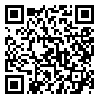Wed, Jan 28, 2026
[Archive]
Volume 37, Issue 1 (2-2023)
Med J Islam Repub Iran 2023 |
Back to browse issues page
Download citation:
BibTeX | RIS | EndNote | Medlars | ProCite | Reference Manager | RefWorks
Send citation to:



BibTeX | RIS | EndNote | Medlars | ProCite | Reference Manager | RefWorks
Send citation to:
Aletaha A, Nemati-Anaraki L, Keshtkar A, Sedghi S, Keramatfar A, Korolyova A. A Scoping Review of Adopted Information Extraction Methods for RCTs. Med J Islam Repub Iran 2023; 37 (1) :743-754
URL: http://mjiri.iums.ac.ir/article-1-8586-en.html
URL: http://mjiri.iums.ac.ir/article-1-8586-en.html
Azadeh Aletaha 

 , Leila Nemati-Anaraki
, Leila Nemati-Anaraki 

 , AbbasAli Keshtkar
, AbbasAli Keshtkar 

 , Shahram Sedghi
, Shahram Sedghi 

 , Abdalsamad Keramatfar
, Abdalsamad Keramatfar 

 , Anna Korolyova
, Anna Korolyova 




 , Leila Nemati-Anaraki
, Leila Nemati-Anaraki 

 , AbbasAli Keshtkar
, AbbasAli Keshtkar 

 , Shahram Sedghi
, Shahram Sedghi 

 , Abdalsamad Keramatfar
, Abdalsamad Keramatfar 

 , Anna Korolyova
, Anna Korolyova 


Department of Medical Library and Information Science, School of Health Management and Information Sciences, & Health Management and Economics Research Center, Health Management Research Institute, Iran University of Medical Sciences, Tehran, Iran , Nematianaraki.l@iums.ac.ir
Abstract: (1727 Views)
Background: Randomized controlled trials (RCTs) provide the strongest evidence for therapeutic interventions and their effects on groups of subjects. However, the large amount of unstructured information in these trials makes it challenging and time-consuming to make decisions and identify important concepts and valid evidence. This study aims to explore methods for automating or semi-automating information extraction from reports of RCT studies.
Methods: We conducted a systematic search of PubMed, ACM Digital Library, and Web of Science to identify relevant articles published between January 1, 2010, and 2022. We focused on published Natural Language Processing (NLP), machine learning, and deep learning methods that automate or semi-automate key elements of information extraction in the context of RCTs.
Results: A total of 26 publications were included, which discussed the automatic extraction of key characteristics of RCTs using various PICO frameworks (PIBOSO and PECODR). Among these publications, 14 (53.8%) extracted key characteristics based on PICO, PIBOSO, and PECODR, while 12 (46.1%) discussed information extraction methods in RCT studies. Common approaches mentioned included word/phrase matching, machine learning algorithms such as binary classification using the Naïve Bayes algorithm and powerful BERT network for feature extraction, support vector machine for data classification, conditional random field, non-machine-dependent automation, and machine learning or deep learning approaches.
Conclusion: The lack of publicly available software and limited access to existing software makes it difficult to determine the most powerful information extraction system. However, deep learning models like Transformers and BERT language models have shown better performance in natural language processing.
Methods: We conducted a systematic search of PubMed, ACM Digital Library, and Web of Science to identify relevant articles published between January 1, 2010, and 2022. We focused on published Natural Language Processing (NLP), machine learning, and deep learning methods that automate or semi-automate key elements of information extraction in the context of RCTs.
Results: A total of 26 publications were included, which discussed the automatic extraction of key characteristics of RCTs using various PICO frameworks (PIBOSO and PECODR). Among these publications, 14 (53.8%) extracted key characteristics based on PICO, PIBOSO, and PECODR, while 12 (46.1%) discussed information extraction methods in RCT studies. Common approaches mentioned included word/phrase matching, machine learning algorithms such as binary classification using the Naïve Bayes algorithm and powerful BERT network for feature extraction, support vector machine for data classification, conditional random field, non-machine-dependent automation, and machine learning or deep learning approaches.
Conclusion: The lack of publicly available software and limited access to existing software makes it difficult to determine the most powerful information extraction system. However, deep learning models like Transformers and BERT language models have shown better performance in natural language processing.
Type of Study: Review Article |
Subject:
Computer scientist and technologist
Send email to the article author
| Rights and permissions | |
 |
This work is licensed under a Creative Commons Attribution-NonCommercial 4.0 International License. |





